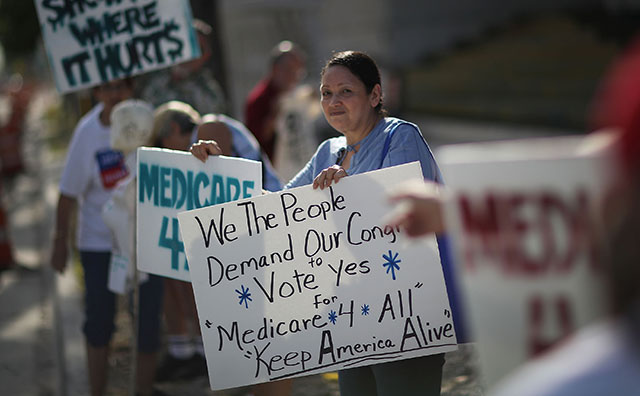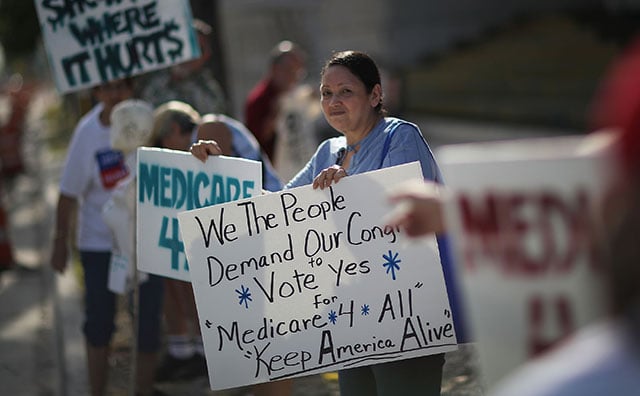
Did you know that Truthout is a nonprofit and independently funded by readers like you? If you value what we do, please support our work with a donation.
 Carmen C. joins with other protesters against Republican senators who have not spoken up against Affordable Care Act repeal and demand universal, affordable, quality healthcare for all on July 24, 2017, in Fort Lauderdale, United States. (Photo: Joe Raedle / Getty Images)
Carmen C. joins with other protesters against Republican senators who have not spoken up against Affordable Care Act repeal and demand universal, affordable, quality healthcare for all on July 24, 2017, in Fort Lauderdale, United States. (Photo: Joe Raedle / Getty Images)
Let’s review the score: Republicans promised for seven years to repeal and replace the Affordable Care Act. So when the party took control of the White House and Congress, President Trump promised an end to Obamacare. First, the House passed (after a couple of tries) a mean-spirited bill that not only repealed the Affordable Care Act but tried to roll back decades of public insurance policy through Medicaid. Then, last week, the Senate failed on that same path and couldn’t even find the votes to repeal a part of the law.
So that debate is over. Now let’s get started on a better conversation about what might really work.
My preference would be for single-payer insurance. It would be much more streamlined (something the rest of the world has already figured out). But we’re a long way from consensus on that notion.
Yet during the recent debate, many of the complaints from Republicans are about health insurance policies that are too expensive for families or just unavailable for purchase. The only answer that actually fixes that problem comes back to a public insurance program of some kind.
Seven years ago, when this debate was led by the other side, I had hoped Republicans would make the case against employer-based health care. (I thought, perhaps, that corporations would want this too, because they would become more efficient.) But that debate never happened. A quiet agreement left that part of the system alone.
How did we ever end up with employer-based insurance? It was an accident, rather than a public policy, and it came about as an exception to price and wage controls that were in place during World War II. But employer health benefits caught on, and by 1963, nearly 8 out of 10 workers were covered by hospital insurance or major medical policies. This accidental health care policy seemed to be working. But starting in the 1980s, companies got stingy, and employer-based policies declined. Today only 49 percent of those insured have policies through work, and in some states that number is as low as 43 percent. More important: The pool is shrinking.
The Affordable Care Act was supposed to reverse that trend by mandating coverage by large employers. But that doesn’t make sense anymore because the nature of work is changing. Since the 1980s, union membership has dropped from 20 percent of the workforce to about 11 percent (health benefits are at the top of any contract negotiation list). Now 7 out of 10 workers are in service-sector jobs, at much lower wages than manufacturing. And 1 out of 10 workers is self-employed.
Employer-based health care has two major problems. First, it’s a paperwork monster. As authors Alain C. Enthoven and Victor R. Fuchs wrote in Health Affairs: “The need for more than 850 health insurance companies to sell and contract with millions of employers, underwriting each one, adds greatly to administrative overhead costs. Typically, administrative costs are of the order of 11 percent of premium, and this does not include the costs to employers to purchase and manage health care spending, including armies of consultants, benefits managers, and brokers. To understand how this could be different, consider that Kaiser Permanente signs one annual contract for the coverage of more than 400,000 employees and dependents with the California Public Employees Retirement System (CalPERS), and CalPERS’ administrative costs are on the order of 0.5 percent of premium.”
This is why employer-based insurance must go away. It’s not sustainable. As a federal-state partnership, Medicaid is complex, with about 51 different plans and a lot of overhead. But its administrative costs are less than 7 percent. Half of the cost from private sector plans. Half.
That brings me to the most maddening part of the debate in Congress. Many Republicans took to the Senate floor last week and complained about the cost of individual health insurance policies and the unavailability of competitive plans in some regions of the country. The solution proposed, however, would have made this worse by selling cheaper plans with skimpy benefits. So insurance for people who needed benefits would be too expensive because only those who needed the benefit would apply.
Lawmakers complained that young, healthy people were paying for insurance coverage for older, sicker people. Of course. That’s the way insurance is meant to work. The larger the insurance pool, the less cost for everybody — sick or healthy.
And that is why Medicaid is the solution. Just open this insurance pool to everybody.
Medicaid already covers nearly 80 million people. It is, by definition, the largest insurance pool in America. Medicaid could be the insurance vehicle that is affordable for both for individuals and for employers. The average spending per person for Medicaid is $5,376. Of course policies for people who could afford to pay more would be higher, but considering that average cost of an employer-based policy is $18,142, there is a lot of opportunity to make the numbers work.
The Nevada Legislature opted for this route last session (only to see the bill vetoed by Republican Gov. Brian Sandoval). Nevada’s Medicaid expansion would have competed with the private sector; consumers or employers could still have purchased those plans if they were affordable. This is a framework that could work, and I expect other states will experiment with some kind of public option for health insurance.
The debate in Congress was wrenching. I know because I watched most of it. And health insurance is not even the most difficult part of our health care problem, not compared to the actual costs of our medical care. Medicaid won this round. And that makes sense because we know it works. So let’s expand it.
Media that fights fascism
Truthout is funded almost entirely by readers — that’s why we can speak truth to power and cut against the mainstream narrative. But independent journalists at Truthout face mounting political repression under Trump.
We rely on your support to survive McCarthyist censorship. Please make a tax-deductible one-time or monthly donation.